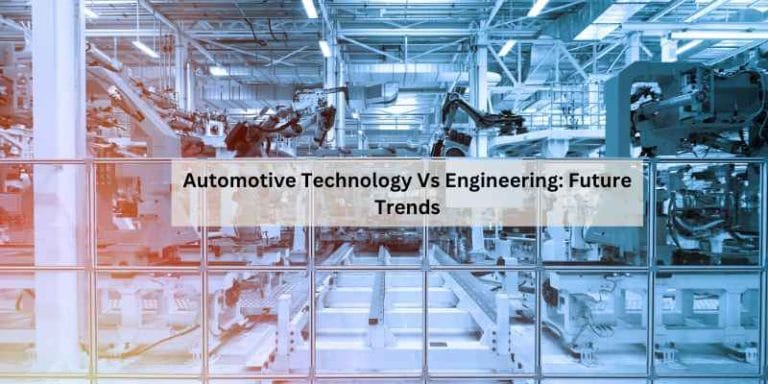Why Automotive is Important: Driving Progress
The automotive industry is important because it plays a significant role in driving the economy forward. It provides employment opportunities to millions of people worldwide, contributes to the development of better roads and transportation systems, and demands significant resources from other supply chains such as oil, steel, plastics, and rubber.
The automobile gave people access to jobs, places to live, and services, and it also contributed to the rise of leisure activities, leading to the development of hotels, amusement parks, restaurants, and fast food chains. Moreover, the automotive industry continues to innovate and bring about new technologies that improve safety, efficiency, and sustainability.
From manufacturing to sales and maintenance, the automotive industry is an essential part of modern society, and its importance cannot be overstated.
The Economic Engine: How Cars Fuel The Economy
Cars are the lifeblood of the economy, driving industries and livelihoods. The automotive sector not only provides jobs for millions but also fuels demand for various goods and services, making it a crucial component of economic growth and stability.
Employment And Job Creation
The automotive industry plays a vital role in driving employment and job creation. With numerous manufacturers, suppliers, dealerships, and service providers, the industry offers a wide range of employment opportunities. From assembly line workers to engineers, salespeople to mechanics, the automotive sector provides jobs for millions of individuals worldwide.
The automotive industry’s demand for skilled workers stimulates job creation in related industries as well. For example, the manufacturing of automotive parts requires a workforce skilled in engineering, metallurgy, and materials science. Additionally, the need for transportation and logistics services to distribute vehicles and parts creates employment opportunities in the transportation sector.
Moreover, the automotive industry indirectly supports employment in various sectors such as advertising, finance, insurance, and legal services. These industries provide specialized services to support the functioning of the automotive sector, contributing to overall job creation and economic growth.
Impact On Related Industries
The automotive industry has a significant impact on related industries, acting as a catalyst for economic growth and development. One of the key industries influenced by the automotive sector is the manufacturing industry. Automobile manufacturers require a vast array of raw materials, including steel, aluminum, plastics, and rubber. The demand for these materials drives the growth of the manufacturing sector and supports the production of automotive components.
Furthermore, the automotive industry plays a crucial role in the development of infrastructure, particularly the construction and maintenance of roads and highways. Improved transportation infrastructure not only facilitates the movement of vehicles but also enhances connectivity, trade, and economic development. As a result, the construction industry experiences growth and increased employment opportunities.
Additionally, the automotive industry stimulates innovation and technological advancements. Manufacturers invest heavily in research and development to improve vehicle performance, fuel efficiency, and safety features. This drive for innovation creates opportunities for technological companies, such as those specializing in software development, electronics, and connectivity solutions.
In conclusion, the automotive industry serves as an economic engine, driving employment, job creation, and growth in related industries. Its impact extends beyond the manufacturing and sales of vehicles, contributing to the overall prosperity of economies worldwide.
Mobility And Freedom: The Societal Impact Of Cars
Automobiles have significantly impacted society, providing mobility and freedom that have led to profound societal changes.
Access To Jobs And Services
The automobile revolutionized access to jobs and services. Individuals could now commute to work and access essential services more conveniently, leading to increased economic opportunities and improved quality of life.
Cultural Shifts And Leisure
With the rise of automobiles came cultural shifts and leisure activities. People had the freedom to explore new recreational activities, leading to the development of leisure-related services such as motels, hotels, amusement parks, and restaurants.
Innovation And Technology: Cars As Catalysts For Progress
The automotive industry is a key driver of innovation and technological advancement, propelling progress across various sectors. From enhancing safety and efficiency to revolutionizing transportation through electrification, cars serve as catalysts for pioneering advancements that shape the future.
Advancements In Safety And Efficiency
Modern automotive technology has led to remarkable strides in safety and efficiency. Advanced driver-assistance systems, such as collision avoidance and lane departure warnings, have significantly reduced the risk of accidents, prioritizing passenger well-being.
Moreover, innovations in engine design and materials have resulted in improved fuel efficiency, reducing environmental impact while enhancing the overall performance of vehicles.
Electrification And The Future Of Transport
The shift towards electrification marks a pivotal moment in the automotive industry. Electric vehicles (EVs) are poised to revolutionize transportation, offering sustainable and energy-efficient alternatives to traditional combustion engine cars.
Furthermore, the integration of smart technologies and autonomous features in EVs is driving the evolution of urban mobility, paving the way for a more connected and environmentally conscious transport ecosystem.
Environmental Considerations: Balancing Progress And Planet
Environmental considerations are becoming more important than ever in the automotive industry. As we progress towards better technology and more efficient vehicles, it is important to balance this progress with the impact it has on our planet. The automotive industry is one of the largest contributors to air pollution and greenhouse gas emissions, making it crucial to find sustainable solutions.
Emissions Challenges
The automotive industry faces significant challenges when it comes to emissions. Traditional gasoline and diesel engines emit harmful gases, such as carbon dioxide, nitrogen oxides, and particulate matter, which contribute to climate change and air pollution. To address this challenge, automotive manufacturers are investing in new technologies, such as hybrid and electric vehicles, which produce fewer emissions and are more sustainable in the long run.
Sustainable Automotive Solutions
As the demand for sustainable solutions increases, the automotive industry is responding with innovative technologies and practices. Sustainable solutions include not only electric and hybrid vehicles, but also renewable energy sources for production, recyclable materials, and reduced waste. Companies are also exploring alternative fuel sources, such as hydrogen, which have the potential to revolutionize the industry and reduce emissions even further.
Infrastructure Development: Building Roads To Opportunity
The automotive industry drives the enhancement of transportation networks.
The Role Of Policy And Investment
Policy decisions and investments are crucial for the expansion of transportation infrastructure.
Global Market Dynamics: The Automotive Industry’s Worldwide Footprint
The automotive industry is a global powerhouse, with a far-reaching impact that extends beyond national borders. Understanding the global market dynamics of this industry is crucial for comprehending its significance in the world economy.
Trade, Tariffs, And Competition
Trade, tariffs, and competition play pivotal roles in shaping the global landscape of the automotive industry. The interplay of international trade agreements and tariffs significantly influences the flow of vehicles and automotive components across borders, impacting market dynamics.
Emerging Markets And Globalization
Emerging markets and globalization are driving forces behind the expansion of the automotive industry’s worldwide footprint. As developing economies embrace industrialization and urbanization, the demand for automobiles and related infrastructure surges, propelling the industry into new frontiers.
Cultural Significance: Cars In The Collective Consciousness
Cars hold immense cultural significance, deeply ingrained in our collective consciousness. Beyond mere transportation, they symbolize freedom, status, and individuality, shaping our identities and lifestyles. The automotive industry plays a vital role in societal development, influencing economies, infrastructure, and personal experiences.
Cars hold a special place in our collective consciousness, shaping our identities and influencing our cultural landscape.
Automobiles In Media And Entertainment
The automotive industry is prominently featured in various forms of media, including movies, TV shows, and music.
The Status Symbol Of Car Ownership
Car ownership symbolizes success and status, reflecting individual personality and lifestyle choices.
Educational And Career Opportunities: Gearing Up For The Future
The automotive industry offers a wide array of educational and career opportunities for individuals looking to build a successful future. Let’s explore the different pathways available in this dynamic sector.
Automotive Education And Training
Automotive education and training programs provide essential skills for aspiring professionals. These programs cover areas such as automotive technology, engineering, and management.
- Hands-on training in state-of-the-art facilities
- Specialized courses in electric vehicles and emerging technologies
- Internship opportunities with leading automotive companies
Diverse Career Paths In The Automotive Sector
The automotive sector offers diverse career paths that cater to a wide range of interests and skills. Whether you’re passionate about design, engineering, sales, or marketing, there’s a place for you in the automotive industry.
- Automotive engineer
- Vehicle designer
- Marketing specialist
- Supply chain manager
Frequently Asked Questions
Why Is The Automotive Industry Important?
The automotive industry is important because it contributes significantly to the economy, providing employment opportunities and driving innovation. It also plays a crucial role in developing infrastructure, such as roads and transportation systems. Additionally, it provides access to jobs, services, and leisure activities, contributing to personal freedom and quality of life.
Why Was The Automobile Important?
The automobile was important because it provided access to jobs, housing, and leisure activities, leading to the development of better roads and transportation infrastructure. It also stimulated the growth of related industries such as motels, hotels, amusement parks, restaurants, and fast food establishments.
What Is The Significance Of Automotive?
The automotive industry is important for providing access to jobs, services, and personal freedom. It also contributes to the development of better roads and transportation infrastructure. Additionally, it plays a vital role in the economy by demanding significant resources from other supply chains.
What Is The Value Of The Automotive Industry?
The automotive industry is of great value due to its contribution to the economy, job creation, and access to transportation. It also plays a significant role in the development of infrastructure such as roads and transportation systems. Additionally, the industry demands resources from various supply chains, further stimulating economic growth.
Conclusion
In essence, the automotive industry is a pivotal driver of economic growth, employment, and societal development. Its impact spans beyond transportation, influencing leisure activities, infrastructure, and service sectors. The industry’s significance is evident in its contributions to innovation, connectivity, and overall well-being of communities worldwide.







